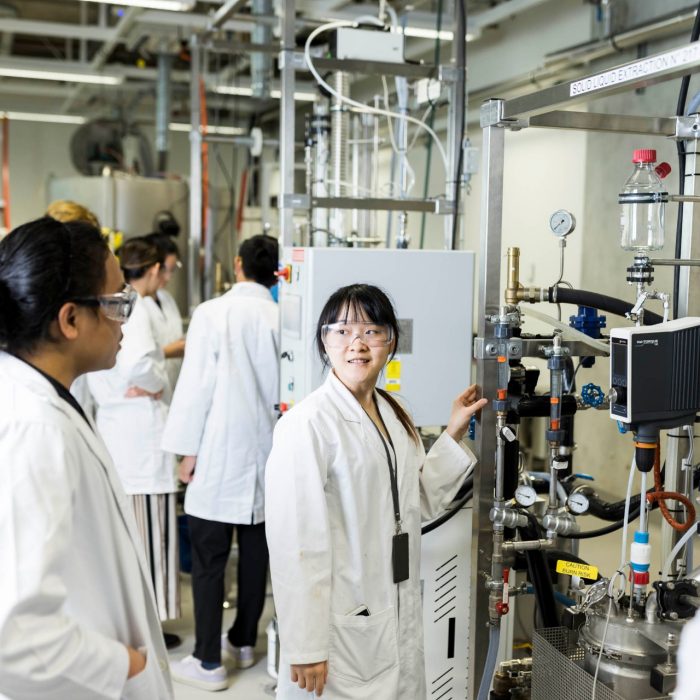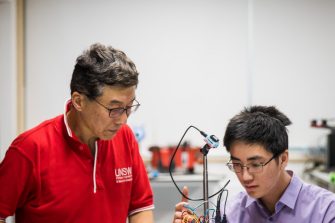Chemical Engineering

What is Chemical Engineering?
Chemical engineering is the design, operation, and improvement of processes used to make everyday products. It involves developing chemical processes and equipment, optimising and controlling industrial operations and minimising environmental impact.
If you're looking for a wide variety of career options, Chemical Engineering is an incredibly versatile field. It plays a crucial role in numerous areas, including:
- Health Technology Advancements: Chemical engineers contribute to the development of medical devices, pharmaceuticals, and biotechnology, improving healthcare outcomes.
- Clean Water Solutions: They design processes for water purification and treatment, ensuring access to safe and clean drinking water.
- Climate Change Mitigation: Chemical engineers develop sustainable processes and technologies to reduce greenhouse gas emissions and combat climate change.
Progress in sustainable food production needs engineers
Learn how UNSW researchers have engineered vegan mozzarella that melts like dairy
By blending plant proteins with complex carbohydrates, UNSW chemical engineers have recreated the colours, flavours and textures of traditional dairy cheese, addressing some of the shortfalls of today's plant-based products.
“Colours and flavours are the easy part, but replicating the structure — that pull of melted cheese, or the juicy mouthfeel of meat — is the real challenge,” says Professor Cordelia Selomulya.
Why study Chemical Engineering?
Chemical engineers are sometimes called ‘universal engineers’ because they efficiently drive large-scale industrial manufacturing processes and are integral to both industry and science. By employing sustainable and environmentally friendly practices, you will learn to harness chemicals effectively and enhance outcomes. As a chemical engineer, you will develop and merge skills and principles in chemistry, physics, mathematics, data science and computing.
Why choose UNSW?
Join a program that is ranked #2 in Australia (QS World University Rankings by Subject, 2025) that'll make future employers take notice. Make connections with students through diverse clubs and societies on offer (think: ChemEng Society and Engineers!). Enjoy learning in $1 billion renovated state-of-the-art facilities with a practical, hands-on approach preparing you for the future.
What about careers?
The most employable graduates are often UNSW chemical engineering graduates. Our graduates thrive in a wide array of sectors such as sustainable energy production, water purification, government agencies and consulting firms, to name a few examples. Graduates are equipped with the skills, knowledge and network to work for companies that produce food, plastics, ceramics, pharmaceuticals, metals or glass – there are endless possibilities.
Career options include:
- Energy Engineer
- Food/beverage Engineer
- Combustion Engineer
- Water Treatment Engineer
- Smelting Engineer
- Production Engineer
- Biochemical Engineer
- Petroleum Engineer
- Process Control Engineer
- Pharmaceutical Engineer
- Data/AI Engineer
How can I study Chemical Engineering?
-
Our specialised degree, the Bachelor of Engineering (Honours) (Chemical Engineering) will provide you with strong skills and knowledge to succeed in the chemical engineering industry.
We offer a range of engineering program specialisations that can be undertaken in our Engineers Australia accredited degrees. You can study Chemical Engineering in the following undergraduate degrees/compatible degrees:
- Bachelor of Engineering (Honours) (Chemical Engineering)
- Bachelor of Engineering (Honours) (Chemical Product Engineering)
- Bachelor of Food Science (Honours)
Double Degrees
- Bachelor of Engineering (Honours)/ Bachelor of Commerce
- Bachelor of Engineering (Honours)/ Bachelor of Science
- Bachelor of Engineering (Honours)/ Bachelor of Arts
- Bachelor of Engineering (Honours)/ Master of Biomedical Engineering
- Bachelor of Engineering (Honours)/ Bachelor of Computer Science
- Bachelor of Engineering (Honours)/ Bachelor of Engineering Science
-
Supercharge your Chemical Engineering career with postgraduate study in:
- Master of Engineering Science (Chemical Engineering)
- Master of Engineering Science (Food Process Engineering)
- Master of Food Science
Graduate Certificates and Diplomas
-
A doctoral degree will allow you to specialise in a specific piece of research.



